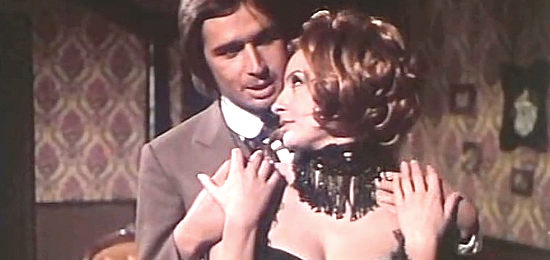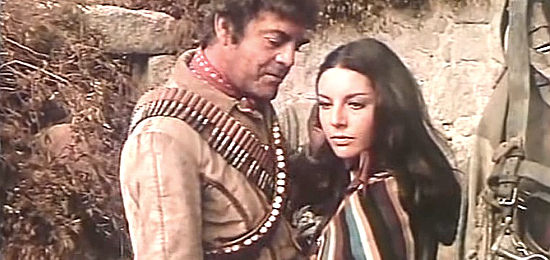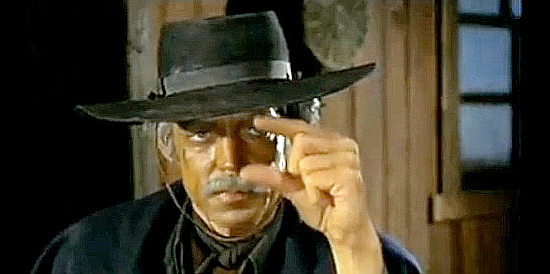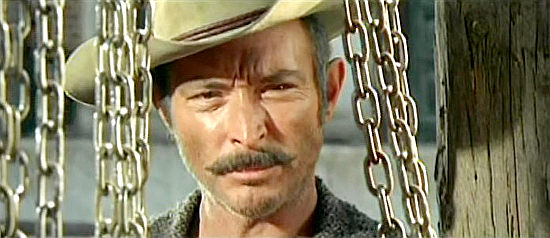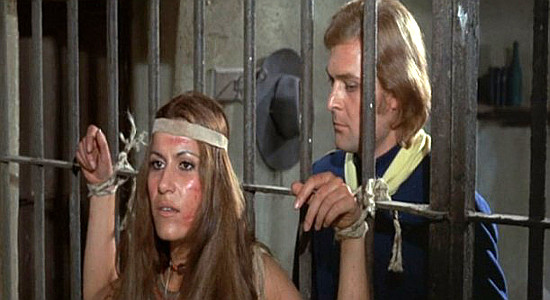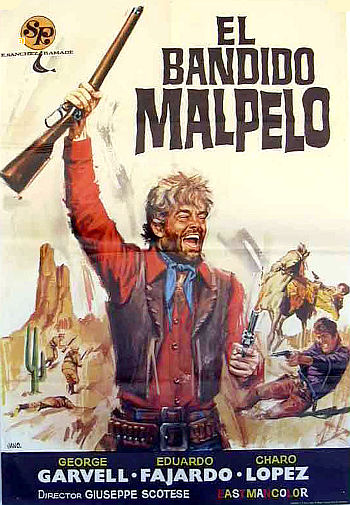 Pancho Villa and his revolutionary army is fighting to overthrow Mexican President Huerta in 1914.
Pancho Villa and his revolutionary army is fighting to overthrow Mexican President Huerta in 1914.
And Diego Medina (George Carvell) has stolen documents detailing plans for the defense of the city of Zacatecas that could prove crucial to accomplishing that goal.
Medina had been passing himself off as a war correspondent from San Francisco, hoping to accompany Gen. Medina Barros to the front lines.
But his ruse is discovered, and Capt. Orozco (Jose Nieto) winds up in charge of tracking down Medina and recovering those documents.
First, he tries to accomplish that by offering a reward to bandits in the area: 10,000 pesos plus a captain’s commission in return for the revolutionary.
Juan Cisneros Malpelo (Eduardo Fajardo) plans to cash in. Until Medina ups the ante, offering 50,000 pesos and a colonel’s rank in the revolutionary army if Malpelo’s guides him to Pancho instead.
Malpelo accepts that offers, but the duo’s troubles soon mount.
When Malpelo doesn’t return with Medina to collect the reward, Orozco orders his mountain camp attacked, wipes out most of his followers, then calls in famed tracker Blas Fuentes to hunt the men down.
Along their journey, Medina gets his first real taste of the cruelty of the revolution and what it feels like to kill.
Malpelo witnesses the same cruelty, and slowly finds himself caring more about Medina’s success as he transforms from bandit to revolutionary himself.
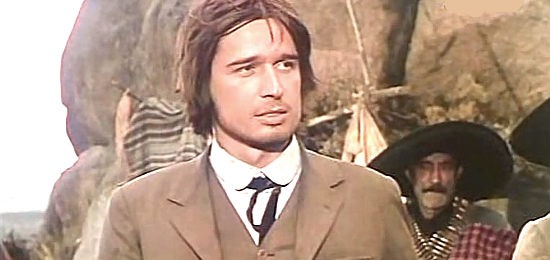
George Carvell as the scholarly revolutionary Diego Medina, explaining his mission in El Bandido Malpelo (1971)
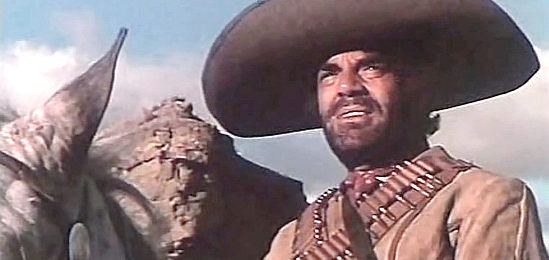
Eduardo Fajardo as Juan Cisneros Malpelo, about to set out on a dangerous mission in El Bandido Malpelo (1971)
 Review:
Review:
The ending is the best part of this rather bleak film on the Mexican Revolution that followed the assassination of Francisco I. Madero and Gen. Huerta’s rise to power.
It features strong performances by Fajardo in the lead role and by his rifle-toting lover Lupe (Charo Lopez), who finds herself fascinated by Medina.
In fact, it’s Lupe who tells Medina the killing will get easier the more he kills. One day, Medina insists, peace will reign and killing will be unnecessary.
Which causes Malpelo to scoff. The only way to keep the peace will be through the threat of violence, he says, noting the irony that the peacekeepers will have to become violent to maintain order.
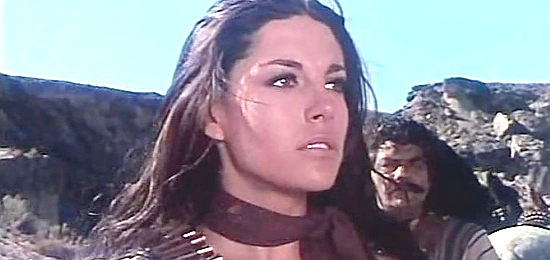
Charo Lopez as Lupe, remembering the betrayal of her people by those in power in El Bandido Malpelo (1971)
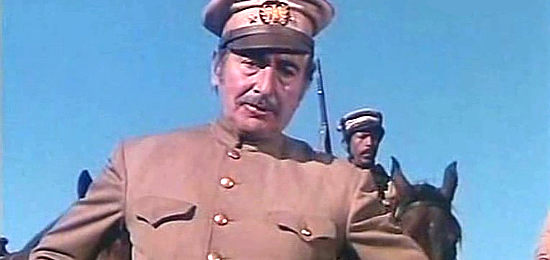
Jose Nieto as Capt. Orozco, leading the federal army’s efforts to local Diego Medina in El Bandido Malpelo (1971)
Directed by:
Giuseppe Maria Scotese
Cast:
Eduardo Fajardo … Juan Cisneros Malpelo
George Carvell … Diego Medina
Charo Lopez … Lupe
Jose Nieto … Capt. Orozco
Sergio Doria … El Timbio
Giovanni Pallavicino … Fuentes
Miguel Del Castillo … Felix Dominguez
Lea Nanni … Maruja
Rita Forzano … Pamela
Also with: Antonio Cintado, Rafael Albaican, Gian Paolo Santini, Rufino Inglés, Ruggero Salvatori
Music: Marcello Giombini
aka:
Long Day of Violence
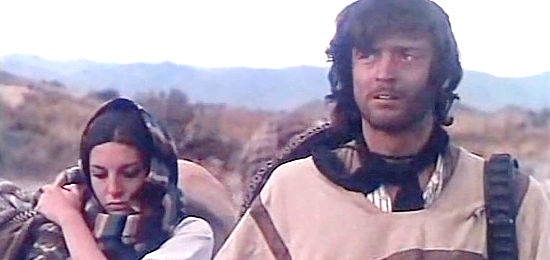
Sergio Doria as El Timbio, trying to reunite with Malpelo following an ambush at his camp in El Bandido Malpelo (1971)
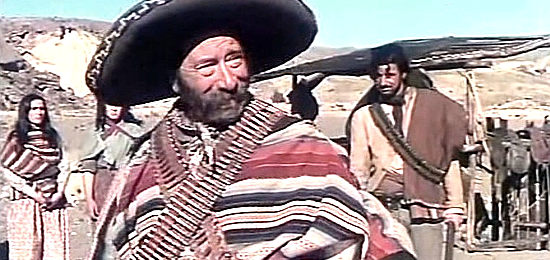
Miguel Del Castillo as Felix Dominguez as Malpelo’s men debate what to do with a captured landowner in El Bandido Malpelo (1971)
Memorable lines:
Malpelo to one of his men: “There is a man in that room. Kick him out! ”
The man: “Yes, boss.”
Malpelo: “On second thought, don’t get complicated. Just kill him.”
El Timbio to rich landowner Don Vicente de Trujillo: “The death you deserve has not been invented yet.”
Diego Medina: “Don Vicente de Trujillo learned since he was a kid that it is okay to rob, starve to death and murder farmhands, Indians and peasants.
Diego Medina: “Why kill him? He is of no use to us.”
Malpelo: “That’s true.”
He kills him anyway.
Medina: “Why did you do that?”
Malpelo: “Since he was of no use to us … The enemy you forgive today is the one who will kill you tomorrow.”
Giovanni Pallavicino as Fuentes, the famed tracker hired to find Medina and Malpelo in El Bandido Malpelo (1971)
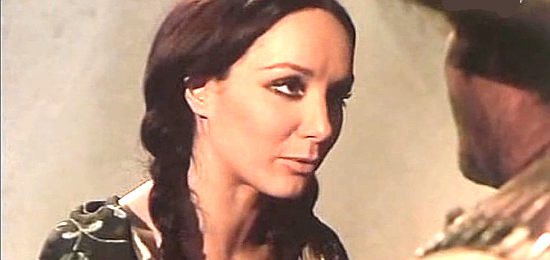
Lea Nanni as Maruja, the cantina girl who winds up with Diego Medina in her room in El Bandido Malpelo (1971)
Trivia:
* A review on the Spaghetti Western database suggests watching the uncut, more violent 90-minute Italian version of the film. Among the cuts: soldiers shooting revolutionaries in the head after they’ve been wounded by a firing squad, the rape of a young girl and the killing of an old woman and fleeing child.
* Charo Lopez was still active as an actress into the 2010s with more than 100 screen and TV credits, according to IMDb. She also played the female lead opposite Fabio Testi in the 1971 Spaghetti, “Dead Men Ride.”
* This marked the only Spaghetti Western and one of the final feature films for director Giuseppe Maria Scotese. Several of his 20 directing credits are for documentaries.
